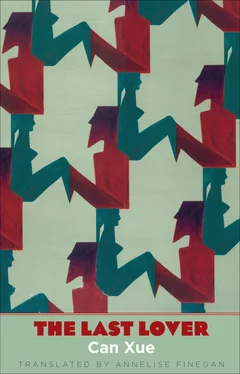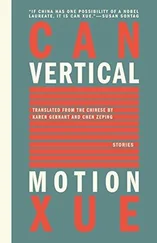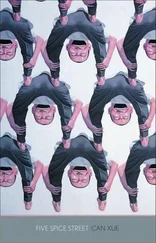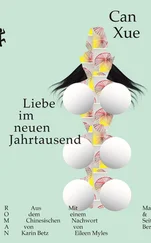Maria put an apple cake in the oven and sat down in a chair, recalling the circumstances of her own girlhood. This had been a small town then. A few shops were scattered thinly along the streets and only one bar was open until two in the morning. Maria’s parents taught at an out-of-town school. She had passed an incomparably lonely youth in this town with her paternal grandfather. She had also been to college and been an office worker at a bank, but in the end she had returned in weariness to her hometown. By then the town had already developed into a midsized city, and that was where she came across Joe. Joe’s eccentricity attracted her. She felt this man was a bit like a cat, and he more or less conformed to the type she favored. The lovers built their present house on the old site of her former home. She resigned from her job and became a housewife. In Maria’s eyes, Joe had been changing all along. The first few years they were together, even though Joe liked to be silent, and when talking liked to “absent his spirit,” she never foresaw that he’d develop into his present state. In recent years, along with the city’s large-scale expansion, Maria realized that her husband’s “soul had left its home.” And she, who didn’t care to go outside, nowadays felt her own hometown grown unfamiliar. There were some streets, some buildings, that she had never been to and didn’t want to visit. One day, however, inside a newly opened bookstore — it was her first visit there — she saw her husband facing a bookcase. Maria didn’t know why her face reddened. As quick as flight she snuck out of the store. After returning home, she hadn’t mentioned this to Joe. It was only in the late night, when everyone was quiet, that she envisioned Joe hidden in some place she didn’t know about, perhaps in the basement of a bookstore, or perhaps beside a water tank on the roof of a high-rise restaurant. Or even on the sidewalk of a recently repaired road, reading books by the bright light of the streetlamps. Maria watched passively as Joe’s interest in books swallowed up everything else, destroying their married life. These past few years, her husband was “journeying in spirit” at nearly every moment. Even when he spoke exuberantly about business at his office, Maria, with perceptive insight, realized that her husband was actually exuberant about something else. Not only did Joe’s changes depress her, but also, at bottom, wasn’t she by nature a woman who liked “something new every day and night”? What Joe’s changes brought out in Maria was a sudden change in herself. Her own changing was not an expansion toward the outside but was rather confined to the family, taking their house as its boundary. Maria wasn’t clear about what she had done in concrete terms. She only felt that now she was like Joe, often able to enter an unusually intense, approximately hallucinatory state. At first this state occurred only when she was weaving tapestries, but slowly things became more complex. In the past two years, she suspected she’d become like her husband, sinking into the snare of “mental journeys,” while this house, and her son, Daniel, accompanied her into the snare. Sometimes, Maria was so frustrated by this feeling of unreality she wanted to scream. Sometimes, instead, she was extremely content. There were a few times, when she was sitting in the house or sitting in the garden, that she clearly heard the voices of her ancestors speaking, her parents and her father’s parents. They seemed to be expressing their objections to her extravagant way of life and their disgust at her immoderate spending.
Maria was a woman who liked extravagance. She had an especially excessive fondness for jewelry. She generally spent as much money as Joe brought in, and the better part of it went to the jeweler. But she didn’t adorn herself with the ornaments she purchased. Instead, she locked them out of the way in a jewelry case. Yet she also bought insurance for the valuable pieces. Joe believed her to be a woman who liked possession. He also knew she didn’t like long-term possession. She only liked the joy produced in the blink of an eye by a purchase. But then why buy insurance? Joe believed that she was compromising to some notion. In addition to jewelry, she bought valuable Persian rugs. When she’d bought so many there was no place left to spread them out, she simply took a few of the rugs that were still quite new and threw them into the garage. Joe had no way to share in the joy of her purchases because every time she went to the shops it was by herself, and after the things were bought and brought back he couldn’t see that there was any special expression on her face. If what she bought was jewels, she locked them in the gigantic jewelry case and that was it; if it was a rug, she spread it out on the floor at once, switching it with the old one. With whatever remained of that day, she did what she needed to do and never spoke of the things she’d bought. Joe sometimes reflected with hatred that she truly was a selfish woman. But on further thought, didn’t he also buy books? Besides, he never discussed his reading with her. At this his anger would disappear.
When Daniel was about ten years old, Maria’s lust for shopping swelled until Joe’s income nearly wasn’t enough to support it. One time she bought an expensive diamond brooch, costing nearly six months of Joe’s salary, and they even took out a small loan. Luckily, Maria wasn’t the sort of housewife to eat an entire mountain of wealth. Later on she began developing her own interests, buying a knitting machine and weaving lambswool tapestries. (Perhaps it was those beautiful Persian rugs that gave her the inspiration?) She was the sort of person who had a talent for real solid work, so from the start there were people who placed orders with her. Since she had begun to weave tapestries, Maria’s desire for shopping had abated somewhat. She grew absorbed in small matters, and inside the house she discovered a few odd signs she’d never noticed before. The very first strange thing she discovered was that the bodies of their two cats carried electricity. When they were in heat, it was so strong she suspected that the electric shock would kill her if she touched them. Was it because the house’s foundations were so ancient that strange things appeared there? The things that couldn’t be explained followed one after another. The roses, the noodle-making machine, the hose irrigating the garden, the stairs to the house all became unreliable. The time when there was a problem with the stairs, Maria, by coincidence, wasn’t wearing her glasses. To her eyes every stair slanted down in the same way. Her legs gave way under her, she sat down, and slid all the way downstairs. When she had collected herself and looked back up, she discovered that the staircase was now fine. These accidents around the house were inconvenient, but on the whole she harbored a kind of nameless and surprised pleasure at them. When she saw Joe getting an electric shock from touching the cats, her heart was also glad. Joe never discussed the strange occurrences with her, and Maria didn’t bring them up either. But when Maria and Daniel were together, the two of them talked over these events spiritedly. One time, when Joe wasn’t at home, mother and son spent the entire day out by the old well in the backyard without intending to. They even ate their meals next to the well. This was because Daniel had witnessed with his own eyes one of the African cats fall into the well, then emerge later from a tunnel that no one had known about. That day the two of them saw no further marvels, but their mood was unusually elated.
“Mother, do you think Pirate is tired of living?” Daniel seemed concerned.
“That’s not so, child. Pirate’s just too absorbed in things, like nighttime animals are by nature. Have you ever seen a smiling dog? But Pirate is able to smile. He practiced this skill in the dark.”
Читать дальше












